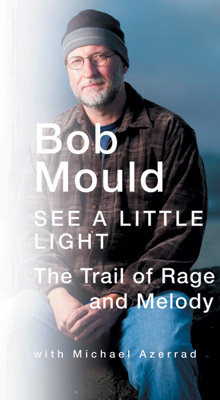Physically anomalous, emotionally centrifugal, Hüsker Dü were never the most stable proposition. In the psychedelic power-drone forcing its way through Bob's guitar, and in the mutant pop classicism of Grant Hart's songwriting, the '60s seemed to be raggedly avenging themselves on punk rock. The band evolved at terrifying speed, throwing off great songs in chunks, each album an epoch, and had already overreached themselves by the time they made their major label debut with Candy Apple Grey (1986). You can't go from being, I don't know, Uniform Choice to being the Who in four years: nature simply doesn't allow it. Self-educated as an obnoxious hardcore power trio, a mobile shitstorm, the Hüskers were cruelly exposed by the slower tempos and widened production of their later material. Gaps opened, entropy occurred. Hart's drumming, in particular, formerly so propulsive, seemed to break down. He had a habit now, while Mould was sober. Warehouse: Songs and Stories (the 1987 Warner Bros. release for which, we learn with horror from See A Little Light, Hart's cymbals were recorded separately) was the sound of posthumousness.
 |
But that mid-period, '83–'85, the SST years, when the vortex was contained, the chemicals were right, and they more or less had it together — bloody hell. Was there anything in rock and roll more urgent than Grant Hart's naked foot on the kick pedal, pumping 4/4 through a song like "Keep Hangin' On"? Only angels have wings, girl/And poets have all of the words/The earth belongs to the two of us/And the sky belongs to the birds. . . . Or the rough ecstasy of Grant and Bob's voices in convergence? Or that guitar-sound, sheeting towards you at eye level? The chemistry was brief and unrepeatable: Bob Mould and Grant Hart are media adversaries these days, blaming each other in print for the band's demise. ("Let's put it this way," Hart tells Andrew Earles, "when you're dealing with two people and one of those people is Bob, and the other person starts enjoying some good luck, well, that luck is going to change.")
So: two books. As a reading experience, I'd have to recommend the memoir over the biography. I've no idea how difficult it was for Earles to write his book (actually, I have some idea), and he's to be congratulated on getting two out of three Hüskers (no Bob) to talk to him — but he might have done a little more legwork for us, dug up a few more sources and elicited a few more stories. A bit more action, if you know what I'm saying. Instead we have completist burrowings ("Following the Man Sized and Rifle Sport LPs, debut recordings by Otto's Chemical Lounge and Final Conflict simultaneously finished the Reflex release schedule of 1983") and airless pages of opinion on the merits of this song/album versus that. Still, there's information here, for which posterity will no doubt be grateful.